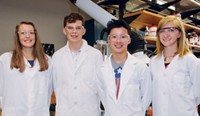Advertisement
Grab your lab coat. Let's get started
Welcome!
Welcome!
Create an account below to get 6 C&EN articles per month, receive newsletters and more - all free.
It seems this is your first time logging in online. Please enter the following information to continue.
As an ACS member you automatically get access to this site. All we need is few more details to create your reading experience.
Not you? Sign in with a different account.
Not you? Sign in with a different account.
ERROR 1
ERROR 1
ERROR 2
ERROR 2
ERROR 2
ERROR 2
ERROR 2
Password and Confirm password must match.
If you have an ACS member number, please enter it here so we can link this account to your membership. (optional)
ERROR 2
ACS values your privacy. By submitting your information, you are gaining access to C&EN and subscribing to our weekly newsletter. We use the information you provide to make your reading experience better, and we will never sell your data to third party members.
Policy
Careers In Chemistry: Time For A Project Bridge?
by Howard M. Peters, ACS Director-at-Large
December 11, 2006
| A version of this story appeared in
Volume 84, Issue 50
This letter to the editor that I wrote appeared in Chemical & Engineering News, May 3, 1971, page 6—more than 35 years ago. There have been changes. Have there been enough?
For the past eight years, I have been a member of the American Chemical Society. Reading the editorials and articles in C&EN, I have watched with amusement as your line has continued about chemical "professionalism," the lack of communication by chemists concerning the value of chemistry to society, the need for chemists to bridge disciplines, and so forth. I have some comments.
First, chemistry is a job, not a profession. For some, it is a well-paid, highly skilled job. True professionals are not viewed, nor are they allowed to view themselves, as an exploitable and disposable resource—ask any attorney, physician, or dentist. We cannot expect, and will not get, bright creative young minds to remain in a "profession" in which they are subject to the whims of forces far beyond their control and are often considered as sheep to be shorn. Unless abrupt changes are made soon concerning the well-being of the individual chemist, ACS will have the distinction of only standing sentinel over a rapidly drying reservoir of talent.
Second, I know the immense value of chemistry to society. But then I have specialized in this field for the past 10 years. How can we possibly hope to communicate the value of chemistry to a general society, when we are doing such a poor job with our own chemists? Less than half of the chemists eligible for membership in ACS ever join. And of those 110,000 present members, how many ever participate in local ACS activities or even bother to vote in ACS national elections? Less than one-third. And with today's society primarily interested in the immediate "buck," how can ACS expect chemists to personally volunteer and involve themselves with nonscientific society in a communication effort, the effects of which may not be apparent for a generation?
Third, I am personally interested in chemists gaining the ability to bridge disciplines. Our C&EN "Career Opportunities" issue of March 1969 repeated the familiar theme: Chemists should develop other specialties. Chemistry needed generalists, not specialists. The lack of chemists in government and other key positions was underscored. Well, what has ACS done to encourage chemists to gain these backgrounds in other fields?
Why doesn't ACS put its money where its mouth is? Do we need more chemists? Do we already have too many Ph.D.s in chemistry? If cross-disciplinary people are so vitally needed, create them! Consider using the Petroleum Research Fund or general funds of ACS for grants, scholarships, and loans to encourage chemists to actively pursue a licensed profession—law, medicine, dentistry? Is it time for ACS to start a "Project Bridge"?
Few chemists return to university to study another discipline. Why? Because they are penalized for making the change. The financing and return to the poverty level of a student is never pleasant, especially if one has the responsibilities of a family. Moreover, scholarship funds in the professional schools have always been limited. And if the chemist has been working for some time, he or she is further penalized when they have been financially responsible. That is, he or she has been able to acquire some equity in a house or stocks, for example, all tangible assets that immediately disqualify him or her from the primary requirement for most scholarships: financial need. The chemist cannot, in good conscience, plead "absolute poverty" because he or she didn't choose to squander income on color TV sets, etcetera.
I have met some chemists who believe their graduate chemistry training was a pleasant experience, who are content with this profession, and who have not considered a career change. Other chemists will make the change and formally continue their education in a bridging field, regardless of the initial financial sacrifice. What is ACS doing to locate, utilize, and encourage these resourceful "bridge" chemists?
I believe ACS should consider starting a Project Bridge and supply some funds, based on ability and not on financial need, to allow chemists over the age of 30 to broaden their talents. If ACS would create a Project Bridge patterned after Project SEED, then I would be the first to contribute.
Unlike some members of ACS who are dissatisfied with the present state of affairs and find it necessary to voice their protest with a resignation, I will not. I think I can be much more effective romping around this organization wearing hobnail boots.
Views expressed on this page are those of the author and not necessarily those of ACS.




Join the conversation
Contact the reporter
Submit a Letter to the Editor for publication
Engage with us on Twitter